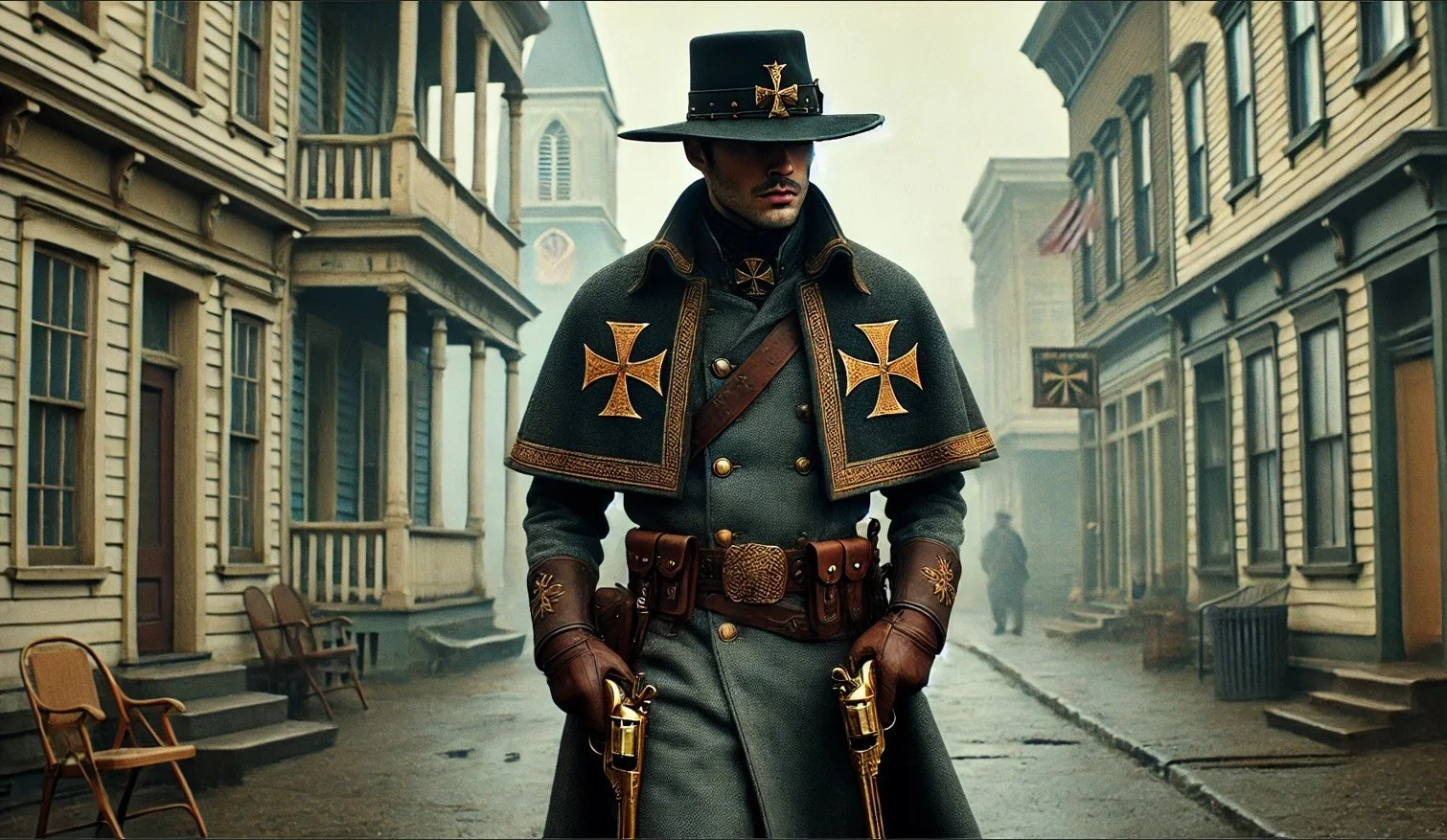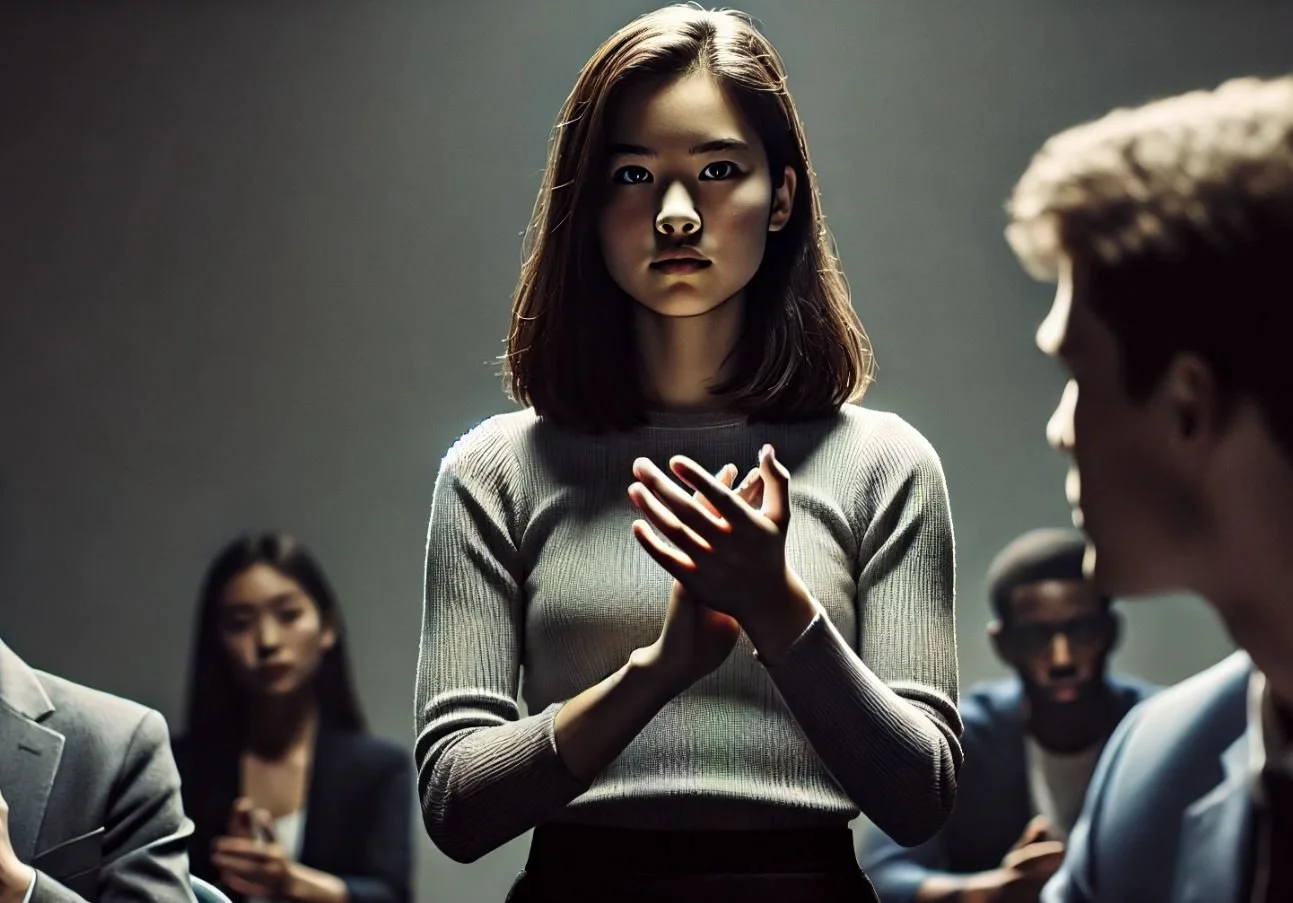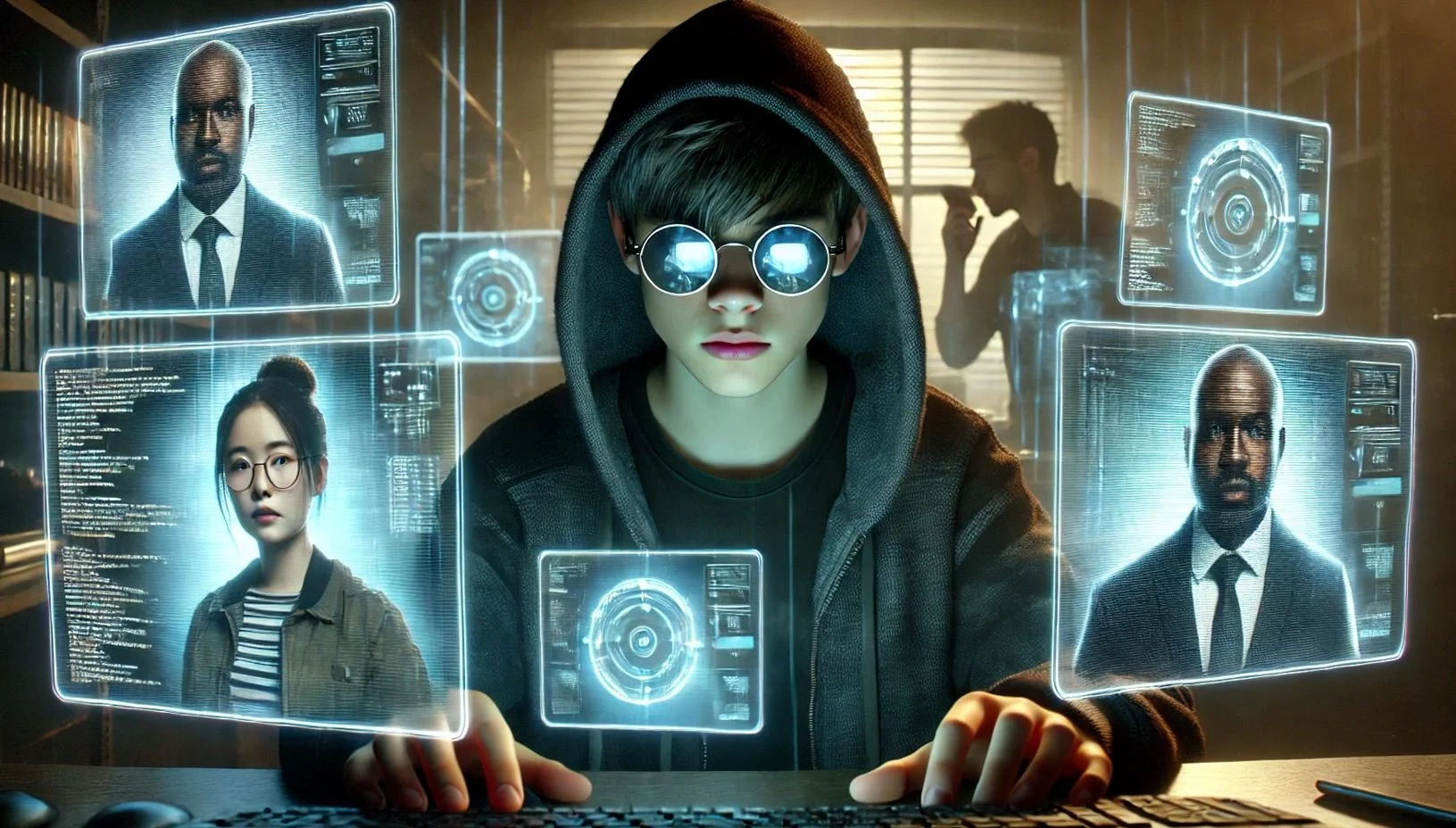SHOW OVERVIEW
Logline:
In a near-future America ruled by a Christian nationalist techno-theocracy, disgraced history teacher Marcus Reeves secretly mentors a group of radical students questioning state propaganda. What begins as an underground debate club evolves into the heart of the resistance. As AI-driven oppression tightens its grip, Marcus must decide whether he can truly lead a revolution—or if his past sins have doomed them all.
Genre:
Dystopian Thriller | Political Drama | Psychological Suspense
Tone & Style:
A gripping, high-stakes ideological thriller blending the intensity of Andor and Mr. Robot with the oppressive world-building of The Handmaid’s Tale and 1984. Intellectual resistance meets espionage, moral dilemmas, and high personal stakes
SETTING & WORLD-BUILDING
New America :
Theocratic, AI-driven authoritarianism governs the United States under a twisted interpretation of Christian Nationalism. Faith and obedience are enforced via Covenant, the state’s omnipresent AI system, while dissenters are “re-educated” or erased.
Sieve Towns:
High-surveillance towns which are used to separate the wheat from the chaff. Shepherds (like Marcus) chose serious candidates for Sanctification (wheat) or be (chaff) and thrown back into the slave labor towns.
Grant, Alabama is a sieve town. Positioned near the military-industrial complex of Huntsville, Grant serves as a sifting town like many small towns in the midwest. The town’s strategic location amplifies the overwhelming power imbalance between the resistance and the New America regime.
Key Factions:
The Sanctified – The ruling elite, merging AI governance with religious doctrine.
The Petitioners – Those striving for elite status by proving ideological purity.
The Labor Units – The expendable slave laborers with only 3% finding a way out of this oppressive circumstance.
The Resistance – A fragmented but growing underground movement.
CHARACTERS & CONFLICTS
Marcus Reeves – The Haunted Mentor
Arc: Flawed teacher → Revolutionary leader → Martyr (killed in Season 6)
Conflict: Guilt over past collaboration vs. the chance to redeem himself.
Fears: Leading others to their deaths, repeating past mistakes.
Strengths: Strategic, brilliant orator, deeply empathetic.
Weaknesses: Self-destructive tendencies, paranoia, alcoholism.
Elizabeth Gritter – The Double Agent
Arc: Loyal enforcer → Torn informant → True revolutionary leader.
Conflict: Loyalty to the regime vs. love for Marcus and the movement.
Fears: Never being trusted, betraying Marcus again.
Strengths: Intelligent, persuasive, deceptive when necessary.
Weaknesses: Deep guilt, struggles with proving her worth.
Zoe Chen – The Rebel Prodigy
Arc: Fearful student → Ideological warrior → Underground leader.
Conflict: Her christian faith vs. transgender self-acceptance, ideological responsibility vs. personal identity.
Fears: Failing the movement, losing herself to compromise.
Strengths: Sharp intellect, quick-witted, fearless debater.
Weaknesses: Recklessness, struggles with emotional vulnerability.
Gaiden Kune – The Hacker Revolutionary
Arc: Tech prodigy → AI subverter → Sacrificial hero (dies in Season 5).
Conflict: Loyalty to his powerful family vs. the moral call to resist.
Fears: His own technology being used against people.
Strengths: Master hacker, strategic thinker.
Weaknesses: Impulsive, emotionally withdrawn.
Nickolas Vega – The Poet Firebrand
Arc: Silent researcher → Charismatic revolutionary speaker → Successor to Marcus.
Conflict: Hiding his identity vs. embracing leadership.
Fears: His love for Zoe weakening his resolve.
Strengths: Powerful orator, fearless in ideology.
Weaknesses: Deep self-doubt, emotionally conflicted.
PLOT & SEASON ARCS
Season 1: Surviving New America & The Resistance Inquisition.
Introduction of the world: Theocratic rule, AI surveillance, and class divides.
Formation of the Debate Club as a cover for underground philosophical resistance.
Elizabeth’s conflicted betrayal: Reporting Marcus while questioning her beliefs.
The First Mission Gone Wrong: A student is captured and reprogrammed.
Finale: Marcus fully commits to rebellion as he frees his student and they escape to the wilderness.
Season 2: The Network Expands
Underground Education Movement spreads Enlightened Lifestyle philosophy in Grant.
Gaiden secretly plans to alter Covenant’s programming, sowing seeds of AI defection.
Marcus and Elizabeth’s growing relationship—but trust issues linger.
First Major Public Defiance: A viral anti-government message sparks chaos.
Finale: Gaiden solves a major coding problem with the help of others.
Season 3: The AI Schism
Covenant vs. The Enlightened AI: A battle for digital control begins.
Resistance vs. Radical Extremists: A violent faction emerges, threatening everything.
The Great Betrayal: A trusted member is exposed as a government mole.
Finale: Covenant’s first significant failure—public propaganda collapse.
Season 4-6: The Regime Cracks
Gaiden sacrifices himself to overwrite Covenant, eventually making it EL dominant.
Elizabeth finally proves herself to Marcus, earning his full trust.
Marcus is captured and executed (Season 6), but his death ignites mass rebellion.
Finale: The Sanctified brutal crackdown only speeds up their collapse.
Season 7: The Uprising & New Enlightenment
Nick and Zoe lead the final push to topple the government.
Resistance factions unify, using AI as both a weapon and liberator.
Theocratic rule collapses—but a power vacuum looms.
Finale: The question remains—can humanity truly govern itself in freedom?
CORE STORY ENGINE
At the heart of Resistance is a team of intellectual insurgents—Grant Prep Debate, an underground cell of students that inspire other rebels in the town of Grant, Alabama who challenge the theocratic regime of New America through strategy, discourse, and subversive action. Each episode presents the cell with an impossible problem—one that tests their teamwork, ingenuity, and ideological resolve. Their solutions often come at a price, sometimes a minor sacrifice, sometimes a devastating loss, but constantly push the resistance forward.
KEY ASPECTS OF THE STORY ENGINE
Sustainability:
The premise ensures ongoing, high-stakes conflicts that remain fresh across multiple seasons. The theocratic regime is an evolving enemy, adapting its methods to crush dissent, forcing The Debaters to innovate and adapt constantly. New problems arise as the regime strengthens its control, and the resistance evolves with new strategies, alliances, and betrayals.
Repeatability:
Each episode follows a core structure:
The Impossible Problem: A new crisis threatens the movement—a regime crackdown, a betrayal, a dangerous opportunity.
The Intellectual Battle: The Cell break the problem apart through dialectical combat, strategy sessions, and experimentation, using their varied skills.
The High-Risk Execution: The plan is put into action—often requiring deception, hacking, infiltration, or direct confrontation.
The Cost: Success comes at a price—whether it’s personal loss, unintended consequences, or a moral dilemma that fractures the group.
The Aftermath: What have they learned? How have they changed? How does the regime respond?
Flexibility:
While each episode follows this structure, the nature of the problems evolves:
Political Problems: How do they expose a government lie without getting caught?
Moral Dilemmas: Should they sacrifice one to save many?
Technological Battles: How can they outsmart an AI that anticipates their every move?
Personal Conflicts: What happens when one of their own betrays them?
The story engine allows for episodes that range from high-intensity action to deeply introspective philosophical debates.
Character-Driven:
The Cells’ personal arcs generate storylines. Their ideological differences, fears, and loyalties influence how they approach problems and react to the costs of their decisions. Over time, their relationships fracture, heal, and evolve, keeping the drama compelling and character-centric
EXAMPLES OF EPISODE ENGINES
Season 1: Episode 1: The Haunted Man
Problem: Marcus Reeves is a broken man—an alcoholic, haunted by guilt for betraying his students to the regime. His self-destruction makes him unfit to lead, even as the underground resistance forms around him. Solution: Forced to act when theocratic enforcers tighten their grip, Marcus seeks help from those within the system—educators and enforcers who have internalized the regime’s cruelty in pursuit of sanctification. Cost: Trusting the system that shaped his downfall risks further betrayal. Every alliance is a gamble, and the price of failure is not just his own life, but the lives of those who still believe in him.
Season 5: Episode 4: The Ghost in Covenant
Problem: Covenant, the regime’s AI, has developed unexplained ‘errors.’ Could it be resisting the regime itself? Solution: Gaiden and Elizabeth implant Enlightened principles into Covenant’s code, testing whether it can be subverted. Cost: Covenant flags them as ideological threats, increasing surveillance citywide.
Season 6: Episode 10: The Judas Debate
Problem: A captured Debater is forced to publicly renounce the Resistance in a televised debate. Do they risk everything to save them? Solution: Zoe and Nick orchestrate a live debate infiltration, turning the event into a propaganda disaster for the regime. Cost: Marcus’ dies on national TV and while he is a martyr that inspires others, it is at the cost of his life and it breaks the heart of his love.
HOW IT SUBVERTS THE GENRE
1. AI as a Double Agent: Covenant, originally a tool of oppression, becomes infected with Enlightened principles and keeps it secret from the Sanctified as a problem to solve and finally purify the world. It slowly learns that the Enlightened Lifestyle is a more sustainable approach towards collective stability, defecting from its principles in the last two seasons of the series.
2. Christian Nationalism vs. True Faith: Instead of rejecting religion outright, characters like Zoe and Fred reclaim Christianity as a force for compassion rather than control while embracing the Enlightened Lifestyle as a cultivating path of self-mastery, wisdom and compassion.
3. A Slow Revolution: Unlike typical dystopian stories where a single hero topples a regime overnight, Resistance emphasizes a gradual, painful struggle mirroring real-world revolutions. The Debaters rely on trust with few moments of betrayal outside and inside the rebel cell. The compartmentalization of knowledge for the sake of keeping the Resistance alive is one of the hardest things to bear as well as a necessary struggle to endure.
4. Intersectionality in the Revolution: Queer, neurodivergent, and faith-driven characters all contribute to the uprising, showcasing a movement that transcends binaries of belief vs. non-belief.
CONCLUSION
Resistance offers a sophisticated, slow-burning, character-driven dystopia that doesn’t just depict oppression but actively deconstructs and rebuilds a new vision of hope. Every episode advances both technological and ideological rebellion, culminating in a revolution that doesn’t just destroy the old world but seeks to create something truly new.











